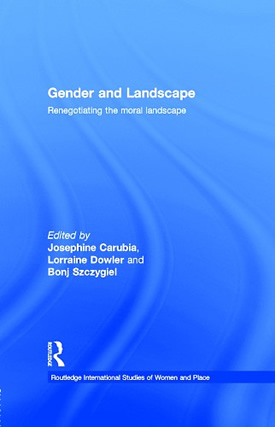Introducing
 Dr Lorraine Dowler is Associate Professor of Women’s Studies at Pennsylvania State University. She obtained a PhD in Geography at Syracuse University, and holds an MLA in Landscape Architecture and a BS in Marketing. Her research interests include gender, militarization, social theory, cultural geography and qualitative methods.
Dr Lorraine Dowler is Associate Professor of Women’s Studies at Pennsylvania State University. She obtained a PhD in Geography at Syracuse University, and holds an MLA in Landscape Architecture and a BS in Marketing. Her research interests include gender, militarization, social theory, cultural geography and qualitative methods.
Geopolitical Passport
Your relationship with geopolitics
At what age did you discover geopolitics and what attracted you to it?
I was trained as a cultural geographer who was interested in political representation, with an emphasis on gender.
I was encouraged by several feminist scholars, in particular Lynn Staheli and Joanne Sharp to present and publish in venues that were more typically associated with political geography.
Which geopolitical topics have your focus and why did you choose especially these?
 I am interested in topics that have often been overlooked in geopolitics such as how people are militarized on an everyday level. I’m particularly interested in how gendered representations often become the weapons of the state to justify violent action.
I am interested in topics that have often been overlooked in geopolitics such as how people are militarized on an everyday level. I’m particularly interested in how gendered representations often become the weapons of the state to justify violent action.
What do you consider your most important contribution to geopolitics?
I’m part of a cohort of political geographers who are shifting attention from the arenas of geopolitics to the everyday spaces of political action
Your geopolitical preferences
What is your favourite definition of geopolitics?
A quote by the Dalai Lama from this article: “The reality of war” – Dalai Lama
“We should think carefully about the reality of war. Most of us have been conditioned to regard military combat as exciting and glamorous – an opportunity for men to prove their competence and courage. […] War is neither glamorous nor attractive. It is monstrous. Its very nature is one of tragedy and suffering.”
Which geopolitical scientist do you admire the most?
Cynthia Enloe: For over three decades she has educated generations of feminist scholars on how international relations is determined, policed and restricted by the experiences and desires of ‘statesmen’.
She has directed us to examine the transnational experience of women. She is also one of the most approachable scholars in the academy consistently offering support and advice to young feminist scholars.
What is your favourite geopolitical book?
“Does Kaki Become You? The Militarization of Women’s Lives” by Cynthia Enloe (1983).
This book was exceptional given Enloe’s challenge to how the military controls men and women’s sexuality and gender in order to maximize military operational efficiency.
What is your favourite geopolitical website?
I don’t have one favourite site but I visit these two on a regular basis:
The geopolitical future
In what direction(s) will geopolitical science be heading the coming decades?
It is my hope that geopolitical science and feminist political geography can support work together in order to move forward with research that details the impacts of political violence on all peoples regardless of gender, race, sexuality and class.
Which geopolitical subject has been too little in the spotlight and needs further research?
The militarization of everyday lives, which paves the way for violent political action.
What will be the largest geopolitical challenge for the world in the 21st century?
A critical understanding of Peace.
